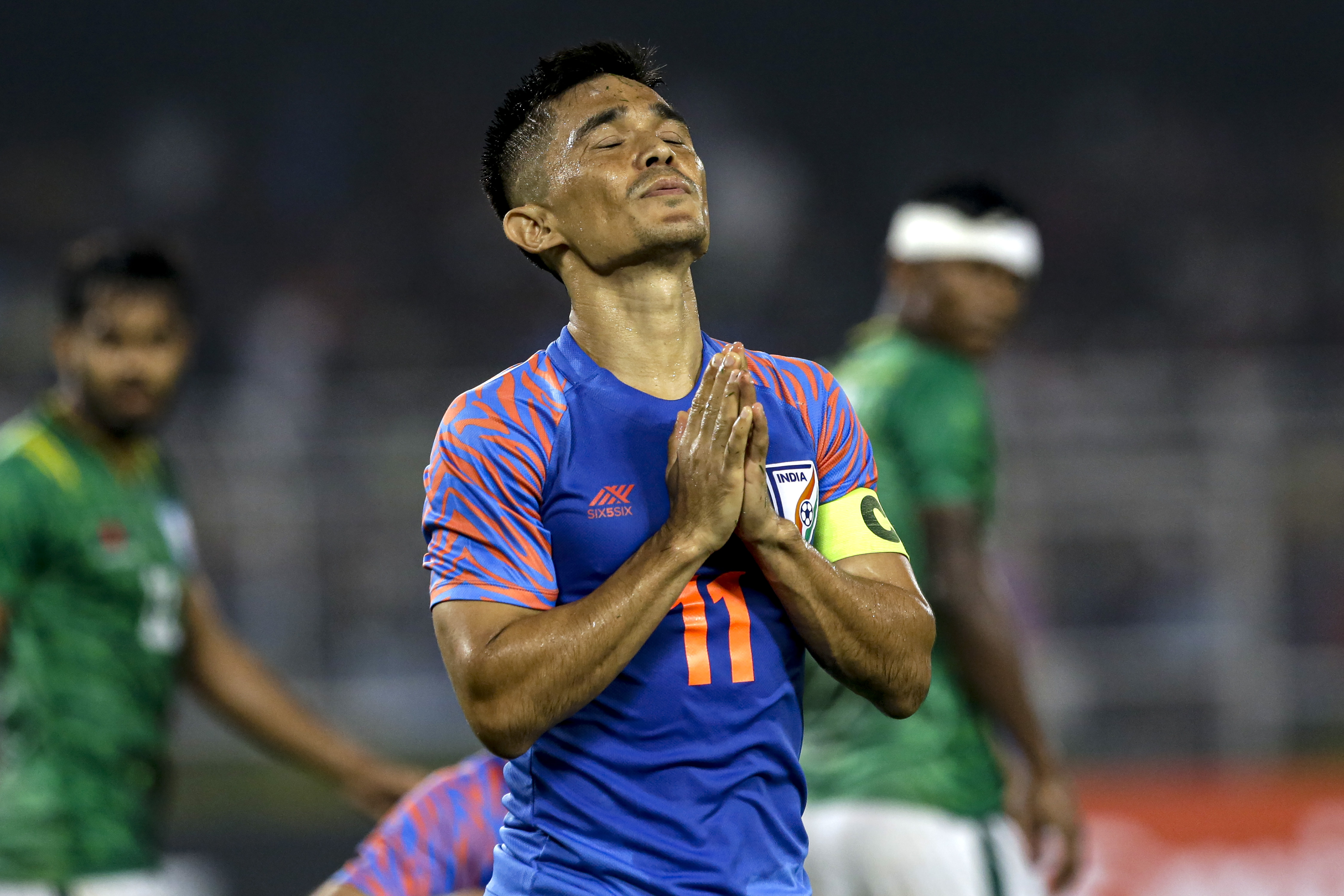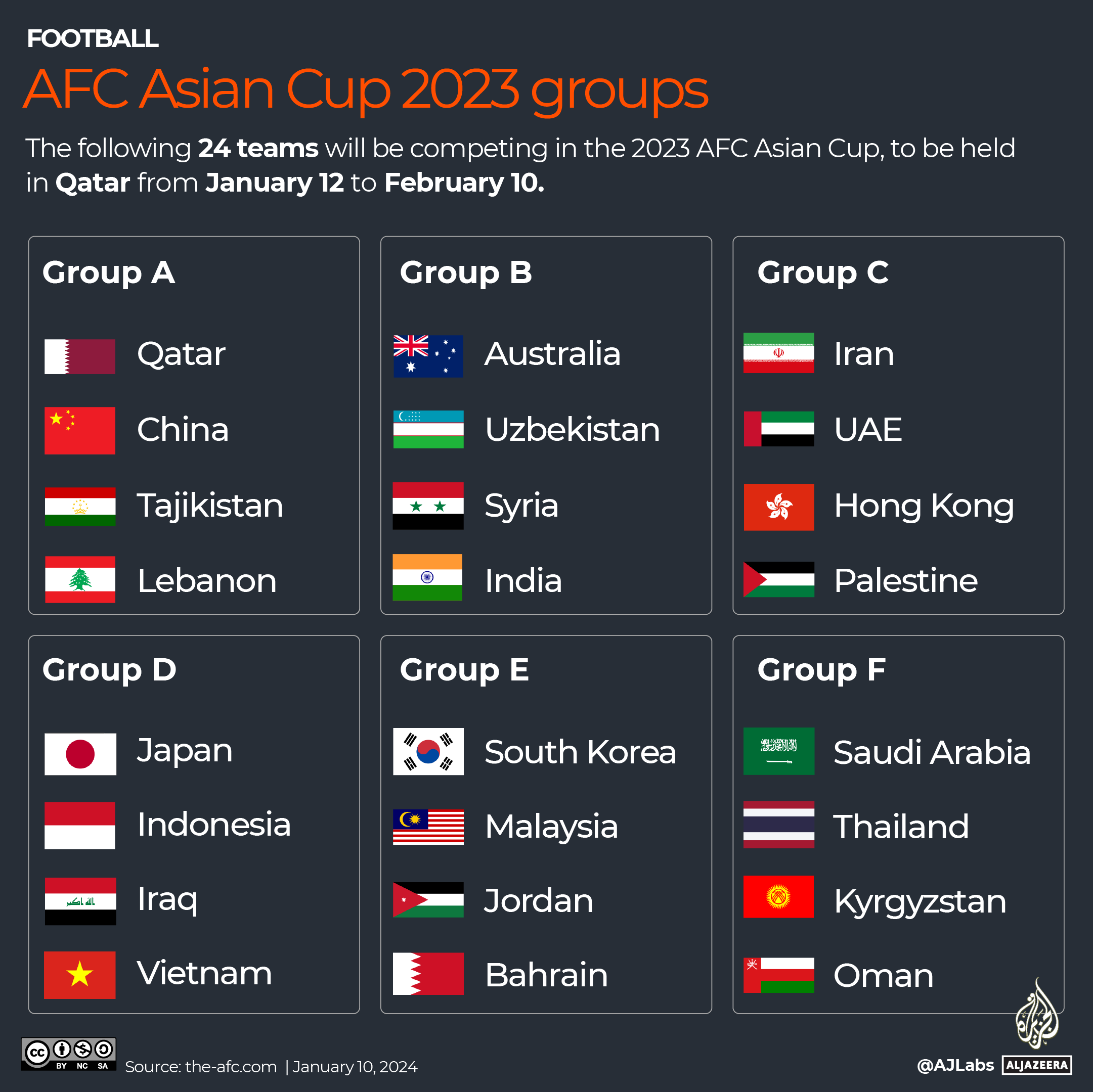
Mumbai, India – For decades, India has lived with the label of being the “sleeping giant” of football.
With a population of 1.4 billion, highest in the world, there is a prevailing sentiment that India is underrepresented in international football.
Compared to its dominance in cricket, the country lags far behind in football and is yet to qualify for a FIFA World Cup.
While former FIFA president Sepp Blatter optimistically declared in 2012 that the “sleeping giant is starting to wake up,” the reality in 2024 paints a different picture.
Currently placed 102nd in the FIFA rankings and not even among the top 10 sides in Asia, India is still in the midst of its football awakening and struggling to emerge from its slumber, experts argue.
“India is not a giant in football because they haven’t done anything on the international front for years,” Stephen Constantine, former head coach of the Indian men’s football team, told Al Jazeera.
Indian football basked in glory in the 1950s and 1960s, clinching gold at the 1951 and 1962 Asian Games and securing a commendable fourth-place finish at the 1956 Summer Olympics.
However, since that illustrious period, India’s performance on the continental stage has been lacklustre, with the team failing to progress past the group stage at the Asian Cup in 1984, 2011 and 2019.
During their last campaign in 2019, the team raised fans’ expectations with a 4-1 win over Thailand in the opening game, but losses against the United Arab Emirates (UAE) and Bahrain meant India missed qualifying for the next round once again.
Now under coach Igor Stimac, India faces a tricky campaign at the Asian Cup, where the men in blue are grouped with teams ranked above them: Australia, Syria and Uzbekistan.
The team’s fearless approach under Stimac has impressed fans, but the coach sparked controversy in November when he said “I don’t consider the Asian Cup as such an important tournament”.
Constantine, who took charge of India in 2002-05 and 2015-19, was surprised at Stimac’s remarks.
“It’s the biggest tournament that India is going to play. What is more important than that?” Constantine said.
Two sleeps away.. 🇮🇳#AsianCup2023 🏆 #BlueTigers 🐯 #IndianFootball ⚽ pic.twitter.com/190vDWk52z
— Indian Football Team (@IndianFootball) January 11, 2024
‘Damage limitation against Australia’
India’s 26-member squad for the Asian Cup is led by the country’s highest goal-scorer, Sunil Chhetri, and includes the same core group of players that Stimac has worked with since taking over. All squad members play for clubs in the Indian Super League (ISL), the country’s top division.
Pradhyum Reddy, an Indian football coach, expects fans to have high hopes for Stimac’s side at the Asian Cup, but says the road to results will not be easy.
India’s campaign opener is against Australia, which reached the round of 16 at the Qatar World Cup 2022 before being knocked out by eventual champions Argentina.
“Australia are seasoned opponents who have got their core group playing in Europe,” Reddy told Al Jazeera.
“But the difference is that under Stimac, India plays on the front foot, so players will try and press Australia and make life difficult for them – maybe even cause them a few problems, but I don’t think we will get any joy out of that game.
“It should be about damage limitation against Australia. Don’t lose by more than what the others did,” added Reddy.
Former player Darren Caldeira believes his country’s best chance of earning points will be against 91st-ranked Syria, as Uzbekistan (ranked 68th) could present tougher challenges.
“No one is talking too much about Uzbekistan, but they are a rising powerhouse in central Asia,” Caldeira told Al Jazeera. “They have some really good players, especially, Abdukodir Khusanov,” he added, referring to the 19-year-old Uzbek defender who plays for Ligue 1 club Lens in France.

The gulf is getting bigger
In the lead-up to the Asian Cup, India won three tournaments in 2023, including the SAFF Championship in July, which featured eight teams from South Asia.
Apart from Kyrgyzstan, all opponents that India faced across the three tournaments are ranked below it. This highlights India’s tendency to play against weaker-ranked opponents – a longstanding concern in Indian football.
“We need to play more games against better-ranked nations,” said former midfielder Caldeira, who is now the director of football at top-tier Indian club Bengaluru FC.
“Maybe there has been an apprehension in the past, fearing the result, but for us to improve we must take risks and challenge ourselves against quality opponents,” he added.
Reddy, CEO of third-tier Indian club Dempo, said the team’s Asian Cup qualification and other achievements mask the issues plaguing the sport at home.
“We’ve improved significantly in the last decade … But comparatively, I don’t think we’ve improved as much as other regional teams including Uzbekistan, Thailand and Vietnam,” Reddy said.
“And certainly not as much as Japan or South Korea – the gulf has got bigger.”
Japan is currently the top-ranked Asian side followed by Iran and South Korea in second and third respectively, while Australia and Saudi Arabia make up the top five. India is 18th on the list.
Former India coach Constantine blamed India’s slow progress on a lack of player development.
“When I came to India in 2002, I realised that there is talent but we weren’t looking for it in the right places. And when we did, we weren’t developing them. This is why India has not gone to the heights we imagined,” said Constantine, the current Pakistan coach.
“At the moment, when you look at the big picture, we don’t dominate in the region. So, if you are not dominating in the region, how do you expect to dominate elsewhere?”

‘It’s comical how little football we play’
Poor quality of coaching at various levels, absence of a robust league and a lack of game time for players have hampered the progress of domestic football.
Constantine, an UEFA Pro Licence holder and FIFA instructor, emphasised the impact of poor coaching on India’s future and questioned the nation’s reliance on foreign coaches who may not prioritise the development of local talent.
“If we don’t care about the development of Indian coaches, then how are we going to develop our players?” Constantine asked. “We must focus on the development of Indian coaches at all levels and insist on quality, not quantity.”
Reddy, who has worked with several ISL clubs, advocates for a nine-month league, aligning with international standards, as opposed to the existing six-month ISL with 12 teams. He also emphasised the lack of game time in the lower divisions of Indian football.
“In the I-League 2 [third tier] and youth leagues, it’s comical how little football we play,” Reddy said. “You compare that with kids in Japan, and how much they play in high school and colleges, it far exceeds what we’re doing at the semi-professional level.”
Caldeira, who previously played in the ISL, said the league has helped the growth of Indian football by bringing in professionalism that was missing earlier.
“In the past, we had a lot of good quality footballers, but now we’re getting quality footballers coupled with athletes,” he added. “I’ve played with a lot of good footballers who were technically pretty good, but in terms of physicality, they probably weren’t as good.
“But now you’re getting to see footballers who can run around for 90 minutes. And then when they have the ball they produce magic.”
Reddy, on the other hand, argued that the ISL has not made a significant change.
“If you were to calculate how much money had been invested in ISL, so much has exited Indian shores because that money has been paid to foreign coaches and marquee players, it’s money that’s not in the Indian ecosystem,” Reddy explained.
“It would have been better having that money being pumped into Indian football in a way that it would develop and leave a tangible asset.”
Describing India as “minnows”, Reddy said that the only way the country can dream of playing at the World Cup is by consistently performing at major youth tournaments.
“We’ve never qualified for an AFC U-23 tournament or the U-17 and U-20 World Cup on merit,” Reddy said. “So until we reach that level, where we’re bringing in teams that are regularly playing continental competition and at all levels on merit, the rest is just hyperbole.”







